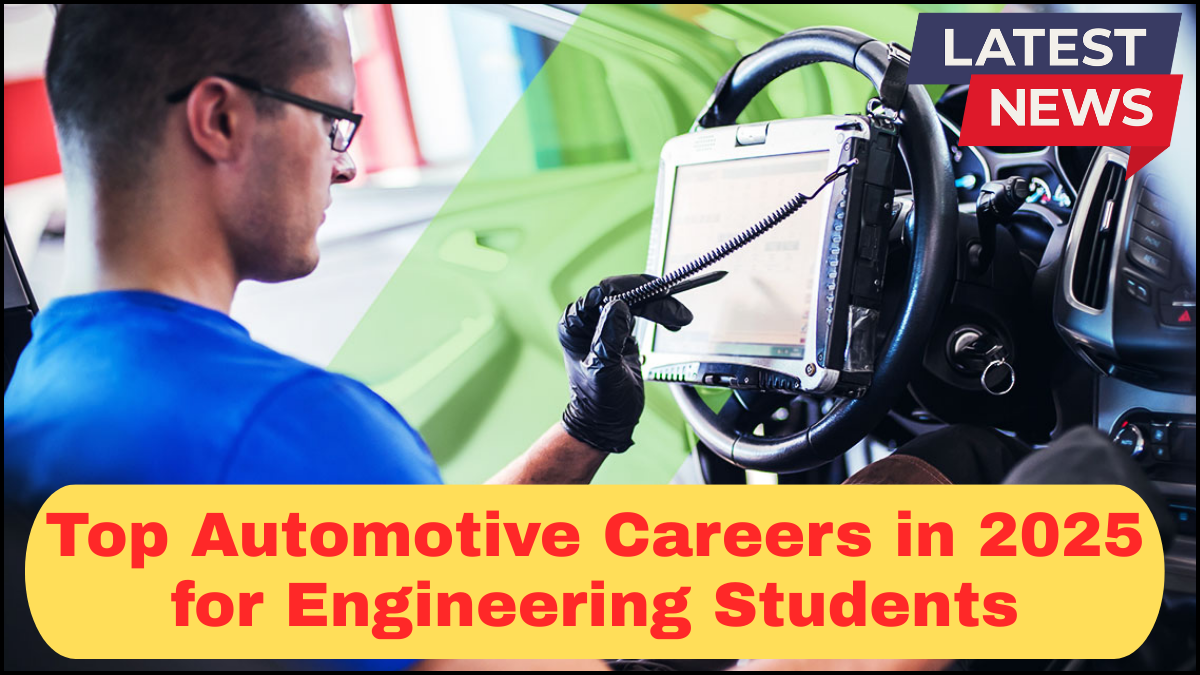The automotive industry is undergoing a radical transformation, driven by advancements in electric vehicles (EVs), autonomous driving, smart manufacturing, and sustainability. For engineering students aiming to secure a strong foothold in this evolving sector, understanding the latest trends in engineering jobs is crucial.
This auto career guide outlines the most promising automotive roles in 2025 and highlights key opportunities shaped by technology, market demands, and placement trends.

1. Electric Vehicle (EV) Design Engineer
As the global automotive market pivots towards sustainable mobility, EV design engineering is becoming one of the most in-demand fields. These engineers are responsible for designing electric drivetrains, battery systems, charging architecture, and ensuring energy efficiency.
Skills Required:
-
Power electronics
-
Battery management systems (BMS)
-
Embedded systems and software
-
Thermal management
Example Career Path: An electrical engineering graduate could start as a junior EV systems engineer and advance to a senior design lead working on cutting-edge EV platforms.
2. Autonomous Vehicle Software Engineer
Autonomous driving is no longer a futuristic concept—it’s a present-day engineering challenge. These professionals work on perception algorithms, machine learning models, and real-time decision-making systems that enable self-driving cars.
Key Technologies:
-
AI/ML (especially computer vision and neural networks)
-
Lidar, radar, and camera sensor fusion
-
Real-time OS and safety-critical software (ISO 26262)
Why It Matters: With OEMs and tech giants investing heavily in autonomous tech, students with software and robotics expertise can carve out a highly specialized niche.
3. Automotive Cybersecurity Analyst
As vehicles become more connected, the risk of cyberattacks has grown exponentially. Automotive cybersecurity analysts play a critical role in safeguarding vehicle networks, ECUs, and over-the-air (OTA) update systems.
Emerging Responsibilities:
-
Penetration testing of vehicle systems
-
Securing vehicle-to-everything (V2X) communications
-
Compliance with UNECE WP.29 and ISO/SAE 21434 standards
Placement Trends Insight: Top recruiters in 2025 are prioritizing candidates with hands-on experience in automotive security labs or ethical hacking certifications.
4. Smart Manufacturing & Robotics Engineer
With Industry 4.0 reshaping production lines, engineers who can integrate smart automation, IoT, and robotics into manufacturing processes are in high demand.
Typical Job Functions:
-
Programming and maintaining robotic arms
-
Implementing predictive maintenance using IoT sensors
-
Streamlining production using digital twins
Auto Career Guide Tip: Mechanical and mechatronics engineering students should focus on industrial automation tools such as Siemens PLCs, ROS, and CAD/CAM software to stand out.
5. Vehicle Integration and Validation Engineer
This role focuses on ensuring all vehicle subsystems—electrical, mechanical, and software—function together seamlessly. These engineers oversee prototype testing, system calibration, and compliance with global automotive standards.
In-Demand Skillset:
-
Systems engineering
-
NVH (Noise, Vibration, Harshness) testing
-
CAN, LIN, and FlexRay protocols
Career Snapshot: These roles are essential during vehicle development cycles and often involve international collaboration, making them attractive for students aiming for global exposure.
6. Sustainable Mobility and Materials Engineer
As sustainability becomes a core industry focus, there’s a growing demand for engineers who can develop recyclable materials, reduce carbon footprints, and optimize lifecycle efficiency.
Focus Areas:
-
Lightweight materials like carbon composites and aluminum
-
Sustainable sourcing and lifecycle assessment (LCA)
-
EV recycling systems, especially battery reuse
Job Outlook: Environmental and materials engineering graduates can tap into this green niche as regulatory pressure increases on OEMs to meet ESG goals.
7. Telematics and Connectivity Engineer
Modern vehicles are smarter, always connected, and data-driven. Engineers in this role manage onboard communications, real-time diagnostics, and infotainment systems.
Tools & Technologies:
-
Cloud-based analytics platforms (AWS, Azure)
-
Over-the-air (OTA) software updates
-
5G integration for vehicle connectivity
Placement Trends Note: With the automotive IoT market expanding, companies are offering hybrid roles that blend telecom, cloud computing, and traditional vehicle electronics.
Auto Career Guide Summary
The automotive landscape in 2025 is complex, tech-intensive, and full of opportunity for engineering students. The best strategy is to build a foundation in core engineering disciplines, then specialize in a niche aligned with current placement trends and technological advancements. Practical experience, certifications, and internships in targeted domains will give you a significant edge.
FAQs
1. Which automotive engineering field has the highest demand in 2025?
Autonomous vehicle software engineering and EV system design are currently the hottest areas due to increased investments and regulatory pushes for sustainable mobility.
2. What skills should engineering students develop for automotive jobs?
In addition to core mechanical or electrical knowledge, skills in AI, cybersecurity, embedded systems, and robotics are increasingly valued across automotive domains.
3. Are internships important for getting automotive engineering jobs?
Absolutely. Internships with automotive OEMs, Tier-1 suppliers, or tech companies involved in vehicle technologies can significantly boost your resume and improve job placement chances.
4. Is the automotive sector a good career path for fresh engineering graduates?
Yes. With diverse roles ranging from EVs and AI to manufacturing and sustainability, the automotive industry offers wide-ranging opportunities for both technical and managerial growth.
click here to learn more